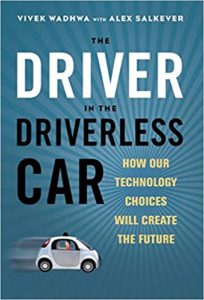Books
‘India Needs to Protect Its Entrepreneurs’

Vivek Wadhwa
Vivek Wadhwa talks about the surge of innovations in his book, The Driver in the Driverless Car: How Our Technology Choices Will Create the Future.
Humanity has encountered the choice of using technological advancement for good or for evil since the invention of the wheel. In the 21st century, we are at the cusp of a new beginning and face the same question again. Vivek Wadhwa, United States-based tech entrepreneur and now full-time academician, explores the ramifications of the good, the bad and the ugly of technology in his latest book, The Driver in the Driverless Car: How Our Technology Choices Will Create the Future, which will be published in India this week — his first book to be also published in India.
“Choices we make will ensure if we have an amazing future or a scary one,” he tells Little India.
He himself has made some bold choices in his life. Before becoming a full-time scholar, Wadhwa founded Relativity Technologies, which was declared by Fortune Magazine as one of the 25 coolest companies in the world in 2001. He, however, gave up his run as an entrepreneur 15 years ago when he had a heart attack. “It was a life-changing experience,” he says.
And he continues to be a part of newer experiences. He is an investor in Health Cube, which he calls as one of the biggest disruptions for the medical industry. The low-cost instant diagnostic tool, being developed in New Delhi, is available for a few hundred rupees, and has already been tried on 300,000 people as part of Idea group’s corporate social responsibility.

When this technology comes to America it will disrupt the healthcare system, opines Wadhwa. He calls healthcare system in the United States corrupt since individuals can’t have access to their own records. “When the poor have medical records on the smartphone it’s better technology than what Americans have today,” Wadhwa says.
However, the ramifications of such advancement are not all positive. The fast pace of technology can also lead to unemployment, with many millions losing their jobs. But, again, what matters is what we choose as a civilization. “What would you rather have in India — the poverty and despair or people being unemployed?” he asks. India doesn’t have to be worried about unemployment for another 30 years, he says, even as professions that require analysis like law, accountancy and even medicine, may soon be replaced by technology. America and Europe have only 15 years before unemployment hits them.
“India needs to recognize that they now have the ability to innovate on their own,” he stresses. “They do not need the west. They need to protect and encourage local entrepreneurs.”
The Silicon Valley investor believes that India is advancing at the same pace as the west. “Tech advancement happens at the same time all over the world now. Self-driven cars are a possibility in India, and even if a minister tries to stop it, he can’t,” he adds. Solar technology, gene medicine, robots, drones will come to India at the same time as America, the futurist says. “In many cases, India will be leading the world in developing these technologies. The disruption is happening now.” India is behind only in artificial intelligence, but it will catch up in a couple of years, says Wadhwa, who is a Distinguished Fellow at Carnegie Mellon University’s College of Engineering, and has held positions at Stanford and Harvard, among other institutions.
He is also optimistic about the cost of solar technology in the country, which will be half the current price in 3-4 years, he projects. Wadhwa, who still has members of his family living in Delhi, was shocked to see the level of air pollution in the city during a recent visit. Solar energy is a solution, he feels, aided by deep subsidies provided to accelerate the growth of the industry, and ban on pollution producing cars and diesel generators.
His previous book, Innovating Women: The Changing Face of Technology, published in 2014 focused on the barriers faced by women in the tech industry in the United States. The book, and Wadhwa’s outspokenness on the issue landed him in the middle of a controversy in 2015 after he was accused in a podcast of drowning out women’s voices in his bid to champion their cause in the industry. Wadhwa soon withdrew from the debate following intense backlash. But he does not shy from speaking on the subject even now. India has more women in technology, he points out, but they too face huge setbacks due to gender bias, adding that Indians in Silicon Valley are as bad as the “white jerks” when it comes to sexism.
What also worries him is the inability of social media channels to check spread of hatred. “Facebook and Twitter enabled the rise of an authoritarian madman [Donald Trump],” he elaborates. “Facebook consulted with the Trump team on how to spread his hatred better. They should be fined Rs 1 lakh every time a fake news article stays for an hour after it’s reported.
“They have gotten away with murder, and have only now taken this menace seriously. AlQaeda, ISIS have all used social media to spread hatred but the organizations have been making money.”
In the book, he often makes references to Star Trek, the TV series he loved as a child, that showed the future of humankind when there is no money. Everyone together strived towards making a better society. Wadhwa too envisions a future without either money or hierarchy.




You must be logged in to post a comment Login